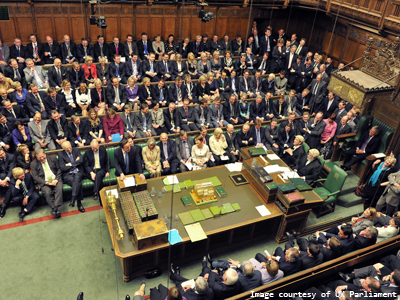Communicating science to parliamentarians
Posted on 21 June 2012
Communicating science to parliamentarians
 By Kristy Revell, Agent and PhD student, University College London.
By Kristy Revell, Agent and PhD student, University College London.
Where do MPs and Lords go for reliable advice on the latest in science and technology? I have long wondered if the majority get their information from the Daily Mail, but I have happily learnt that this is not usually the case during my time at the Parliamentary Office of Science and Technology (POST).
Since April, and with thanks to an EPSRC fellowship, I have been seconded from my usual home at UCL to the beautiful Palace of Westminster. Well, not exactly. POST’s offices are actually in the less glorious Millbank, but luckily there is a reasonably priced cafe and I’ve been able to make use of the bars within the Houses of Parliament, so all is not lost.
Back to the Daily Mail, was I being unfair to parliamentarians in my earlier assumptions? Maybe, maybe not. After all, parliamentarians are not scientists, they are politicians and only a handful have a background in science or technology. So why wouldn’t they get some of their information from the world's most visited newspaper website?1
Thankfully, parliamentarians do have three reliable and accessible information sources in the Houses of Parliament, in the form of POST, the Commons Library and the Lords Library. The Commons Library undertakes many duties including dealing with direct enquiries from MPs, a service which many make use of, whereas POST offers a slightly different service.
The remit of POST is to disseminate the latest news in science and technology by examining the evidence and presenting it in an accessible format. This is done primarily through events and short four-page briefings called POSTnotes. POSTnotes are balanced and do not make recommendations. The topics for POSTnotes are selected based on the policy implications of current science and technology issues.
Once the POSTnote is written, the biggest challenge remains in getting parliamentarians to read it. Parliamentarians are very busy people, with little time for reading briefings. This is why the POSTnote are designed so that they can be read in full or simply skim-read. Section headings mean MPs can quickly identify the paragraphs relevant to them. The fundamental rule of the POSTnote is that it can be no more than four sides in length, so that it can be read in the back of taxi.
MPs do refer to POSTnotes in debates and the MPs I have spoken to are aware of POST’s work, so it looks like something is working. POSTnotes are publicly available online so they also offer an important, reliable and balanced sources of scientific information for the public.
If you would like to see the POSTnotes that are available, visit the POST publications webpage.
If you are interested in POST fellowships from the EPSRC, visit the EPSRC website.
1Wheeler, Brian (2012) How the Daily Mail stormed the US. BBC, 27 January 2012.

